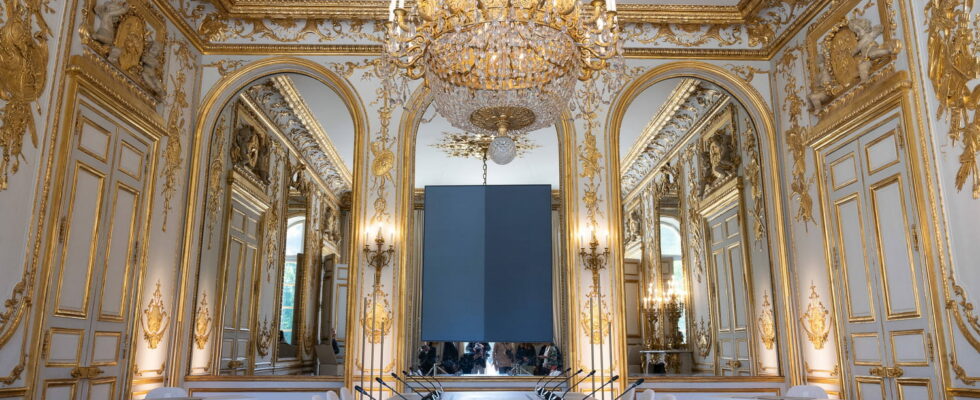Faced with the scenario of a relative majority, how could the future government be organized? The first elements.
The unknown is total, the fog is thick and the glow of calm does not seem likely to penetrate the clouds. An atmosphere of chaos hangs over French political life, fueled by the uncertainty of the result of the legislative elections. Will the National Rally be in the majority? Will the united left regain power in the Assembly? What if no party obtains the minimum 289 seats necessary to govern? This scenario, which seems the most likely in view of polling trends, suggests a period of great uncertainty regarding the governance of the country. With, ultimately, total immobility?
If they obviously do not have the value of the results of D-Day, the projections of results, in number of seats, show that only a relative majority will give birth to the election. Understand: a political group will have the greatest number of deputies in the Bourbon Palace but not enough for it to represent half of the seats. It is therefore impossible to ensure the vote for each proposed law since there will be more opponents. This is already the situation in France since 2022 with a main group of 250 deputies committed to the cause of Emmanuel Macron. Alliances, text by text, have been forged with other parties, without counting the number of recourses to article 49.3 of the Constitution, which allows a law to be adopted without the vote of the Assembly, if the deputies refuse to vote on a motion of censure.
On the evening of the second round of legislative elections, the difficulty will be quite different. If the National Rally obtains a relative majority, it will be very difficult for it to obtain an alliance to be able to govern. According to projections, between 195 and 245 RN deputies could be elected. He would therefore need to find between 44 and 94 allies. This seems impossible as it stands, with numerous calls not to play into the hands of the far right. Ditto at the other end of the political spectrum. If the left-wing coalition passes, it is also difficult to imagine a few dozen additional deputies going in their direction, as the Macronist and Frontist candidates are so opposed to their program. So, which government for France?
The situation should be historic because never before known in France: a President of the Republic will be at the Elysée and will have to deal with a National Assembly without an absolute majority and whose largest contingent of deputies does not come from his camp . Emmanuel Macron will therefore be faced with a puzzle: who to appoint to Matignon? A personality from the majority group? Or another? To understand clearly, two options are available to the head of state:
- Macron appoints a Prime Minister from the most represented group: this forms a government but does not have a majority in the Assembly. Its laws can therefore be challenged and the Prime Minister is exposed upon his appointment to a motion of censure which, if adopted by 289 deputies or more, will lead to the fall of the government. It will therefore be necessary to change Prime Ministers and reform a new government, undoubtedly very quickly. And start again.
- Macron appoints a personality who does not come from the majority group: this forms a government of national unity, drawing from various political groups, capable of attracting the support of at least 289 deputies. Here again, he can be dismissed by a simple vote of a motion of censure.
The second option seems to be the most plausible in the eyes of political scientists. “Usually, the President of the Republic chooses a Prime Minister from within the largest group in the National Assembly. But in reality, this is not obligatory. Emmanuel Macron could quite well appoint a consensual figure outside of this majority to seek appeasement and consensus with a view to a coalition”, explains Dominique Rousseau to the Point.
In Le FigaroBenjamin Morel presages the appointment of a “wise old man as Prime Minister. A politician who displeases no one, capable of creating an alliance going from the extreme right to the extreme left. His mission would be to lead the government until the new legislative elections.”
It remains to be seen who could embody this figure. The daily puts forward the hypothesis of Charles de Courson, the oldest member of the Assembly and a centrist figure discovered by the general public during his opposition to pension reform.
Could the name of François Bayrou also be whispered? A Macronist from the start, very close to the President of the Republic, the mayor of Pau has always defended a government of “national unity”. But with who ? The “moderate” left and right? In recent days, he met former PS ministers Manuel Valls, Bernard Cazeneuve and François Rebsamen, as well as Xavier Bertrand, LR president of Hauts-de-France and former Sarkozy minister. The first milestones for a future government team? And Gabriel Attal in all this? Nothing would prevent Emmanuel Macron from renaming it.
